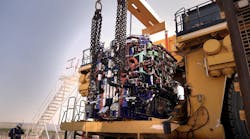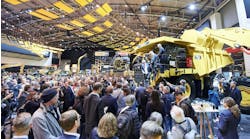First Mode, a Seattle-based engineering firm focused on sustainability solutions, has developed a powerplant comprised of hydrogen fuel cell and lithium-ion battery technology. Multiple fuel cells delivering up to 8 kW of power and a 1.2 MWh battery pack provide a total power output of 2 MW. This enables the system to power what is considered the world's largest zero-emission haul truck currently being utilized in Anglo American's platinum mine in South Africa.
The vehicle is a Komatsu 930E-4 Ultra Class Haul truck which weighs about 200 tons when empty and stands three stories tall. It can carry up to 300 metric tons of ore across the mine site. Doing so when powered by a diesel engine produces emissions while burning thousands of gallons of fuel; according to First Mode's press release announcing the project, large trucks like this account for 70-80% of diesel fuel consumption at Anglo American's mine sites.
But by replacing the diesel engine with the hydrogen fuel cell and battery powerplant, fuel use and emissions can be reduced. First Mode states in its press release that its powerplant keeps 700 cars' worth of carbon dioxide (CO2) emissions out of the atmosphere.
"At First Mode, we know we are at a 'fire-everything' moment. The urgency in front of us requires that we deploy every tool and every technology to battle climate change," said Chris Voorhees, president and CEO of First Mode, in the company's press release. "I'm so proud of the team and our partnership with Anglo American, focused on decarbonization at the source to affect the meaningful, necessary change we all seek. We hope that this zero-emission clean energy breakthrough will inspire others to create significant action in the fight for our planet."
Hybrid System Meets Application Needs
The First Mode powerplant is designed to be a retrofit solution, enabling Anglo American to more immediately take advantage of its fuel and emissions savings, and eliminates the need to buy a brand new machine.
First Mode received sign-off on its initial design for the powerpack in 2019. Creating a drop-in replacement for the diesel engine required intense engineering work to ensure the solution would fit within the same space claim as the engine and work with various components and systems already in the haul truck.
The company says in its case study outlining the project that initially a pure battery-electric solution was considered but would ultimately not meet the needs of the mining operation. Hot swapping the battery was not possible and charging times would be too long for the site's schedule.
Utilizing a hybrid powerplant, however, helped to overcome these issues as the fuel cell and battery technologies can supplement one another to ensure appropriate run times for the operation.
Hydrogen is seen as a more feasible alternative for larger equipment applications like mining because of its power density and longer run times, while producing only water as a byproduct. Pairing that with a battery can ensure all machine systems receive the power they need and the haul truck can withstand long work days on the mine site.
Refueling for hydrogen is faster than recharging a battery, further ensuring the mine site can stay on schedule.
Hydrogen is also an abundant energy source, aiding its viability as an alternative to diesel while providing similar performance. Several advancements in hydrogen fuel cell technology have been made in recent years, making it a more plausible option.
Emissions Drive Need for Alternative Solutions
Like many heavy equipment applications, mining is a large producer of emissions. Per First Mode's press release, the mining industry accounts for approximately 7% of global CO2 emissions and diesel haul trucks can represent as much as 50% of total energy use at mine sites. As such, finding methods to reduce emissions and energy use from mining operations is vital to help curb climate change.
Electrification of mining equipment, particularly underground mining where safety is a large factor, has been on the rise over the last several years. Many electric machines are designed from the ground up but drop-in replacement solutions like First Mode's are important options as well.
Global mining company Anglo American is known for working on advanced technology projects such as trialing autonomous mining equipment and alternatively powered machines. The project with First Mode is part of its nuGen Zero Emission Haulage Solution (ZEHS) in which a fully integrated green hydrogen system is utilized to power the truck. The company will produce green hydrogen–generated via renewable energy or low-carbon power sources to ensure minimal environmental impact–on site for fueling the retrofit truck.
Producing hydrogen with renewable energy sources such as wind and solar helps to assure the sustainability of the entire fuel production and use process. While batteries and hydrogen offer opportunities to reduce emissions from vehicles, often their production is not as environmentally friendly. But taking advantage of the resources available in South Africa where Anglo American's mine is located to produce the hydrogen helps create a more sustainable mining operation.
This is a key goal for Anglo American as part of its FutureSmart Mining initiative. The company is looking to make its operations more sustainable through the use of innovative technologies and aims to achieve carbon-neutrality across its operations by 2040.
"nuGen is a tangible demonstration of our FutureSmart Mining program changing the future of our industry," said Duncan Wanblad, chief executive of Anglo American in the company's press release announcing the launch of the hydrogen-battery hybrid truck. "With diesel emissions from our haul truck fleet accounting for c.10-15% of our total Scope 1 emissions, this is an important step on our pathway to carbon neutral operations by 2040. The mining industry is playing a considerable role in helping the world decarbonize, both through our own emissions footprint and the metals and minerals that we produce that are critical to low carbon energy and transport systems.
“Over the next several years, we envisage converting or replacing our current fleet of diesel-powered trucks with this zero-emission haulage system, fueled with green hydrogen. If this pilot is successful, we could remove up to 80% of diesel emissions at our open pit mines by rolling this technology across our global fleet."


